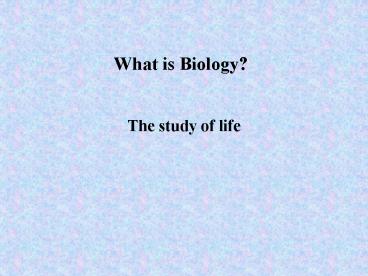What is Biology - PowerPoint PPT Presentation
1 / 29
Title:
What is Biology
Description:
are composed of one or more cells. contain a blueprint of their characteristics ... best under narrow range of conditions. maintain stable internal conditions ... – PowerPoint PPT presentation
Number of Views:265
Avg rating:3.0/5.0
Title: What is Biology
1
What is Biology?
- The study of life
2
Biology is Relevant
- Global problems are often Biological Problems
- Medicine
- Bioengineering
- Environment
3
Biology can be Controversial
- If I choose to limit my family size, what methods
of birth control do I use? - Is it right to protect an endangered species at
the expense of jobs? - Is it ethical to use fetal tissue in biomedical
research? - Are there dangers in cloning humans?
- Are irradiated foods safe to eat?
4
What is Life?
- Give your own definition
5
Living Organisms
- Are highly organized, complex entities
- are composed of one or more cells
- contain a blueprint of their characteristics
- acquire and use energy
- carry out and control numerous chemical reactions
- produce offspring similar to themselves
- respond to changes in the environment
- may evolve into new types of organisms
6
- Inanimate objects may possess some of these
characteristics, but not all of them.
7
Biology is a Branch of Science
- Biology, physics, chemistry, geology, etc. are
branches of science - All branches
- pursuit of information
- bodies of knowledge
- have unique features/attributes
8
Study of Life Has Unique Questions
- Question 1 What happens when you push a
stationary ball? - Question 2 What happens when you push a
sleeping dog?
9
- Physical sciences are deterministic
- Action A leads to Response B
- Biology is probabilistic
- Action A leads to Response B, C, D or E
with each having W, X, Y and Z probabilities of
occurring
10
Disciplines of Biology
- The disciplines of biology are all interrelated
and should not be viewed as separate, independent
entities.
11
Key Course Concept
- The living world is a hierarchy, with each level
of biological structure building on the level
below it.
12
Hierarchy of Life
13
Major Theories of Biology
- Evolution by Natural Selection
14
T. Dobzhansky (geneticist)
- Nothing in biology makes sense
- except in the light of evolution
15
Major Theories of Biology
- Evolution by Natural Selection
- Inheritance
- Gregor Mendels experiments leading to the
discovery of hereditary factors (genes)
16
Major Theories of Biology
- Evolution by Natural Selection
- Inheritance
- Cell Theory
17
Major Theories of Biology
- Evolution by Natural Selection
- Inheritance
- Cell Theory
- Biological Classification
- Carolus Linnaeus system of nomenclture
- Scientific names unique to a species
- Hierarchical system based on relatedness
18
Italicized Scientific Name
19
Major Theories of Biology
- Evolution by Natural Selection
- Inheritance
- Cell Theory
- Biological Classification
- Bioenergetics
- energy that powers life
- operates under same rules that govern energy in
the inanimate universe
20
Major Theories of Biology
- Evolution by Natural Selection
- Inheritance
- Cell Theory
- Biological Classification
- Bioenergetics
- Homeostasis
- organisms function best under narrow range of
conditions - maintain stable internal conditions
- allows organism to live in a wider range of
conditions
21
Major Theories of Biology
- Evolution by Natural Selection
- Inheritance
- Biological Classification
- Bioenergetics
- Homeostasis
- Ecosystem
- organisms interact with each other and their
environment - Entangled Bank
22
How is Biology/Science Studied?
- Observation
- Questioning
- Hypothesis
- Testing
- Explanation
- These topics comprise the Scientific Method
23
Observation
- Seeing and recognizing something that is of
interest, concern, or a curiosity
24
Questioning
- Asking why does this happen, how does this
work, etc. - Is it a testable question?
- If yes, then it is a question that fits the
scientific method
25
Testing
- Develop a study or experiment that will test the
hypothesis - Should have sound experimental design
- Should be repeatable
26
(No Transcript)
27
Explanation
- Interpretation of findings
- Was the hypothesis rejected?
- How do findings relate to those of others?
- What is the significance of the findings?
28
Hypothesis
- A preliminary answer
- previous experience
- published information
- best guess
- A hypothesis does not have to be correct
- Scientific investigation attempts to falsify a
hypothesis
29
Report Your Findings!!!!
- Graphically
- Numerically
- Written
- Orally

